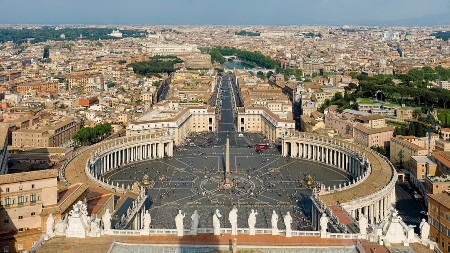We ask you, urgently: don’t scroll past this
Dear readers, Catholic Online was de-platformed by Shopify for our pro-life beliefs. They shut down our Catholic Online, Catholic Online School, Prayer Candles, and Catholic Online Learning Resources—essential faith tools serving over 1.4 million students and millions of families worldwide. Our founders, now in their 70's, just gave their entire life savings to protect this mission. But fewer than 2% of readers donate. If everyone gave just $5, the cost of a coffee, we could rebuild stronger and keep Catholic education free for all. Stand with us in faith. Thank you.Help Now >
'Sub Regno Obamae'
FREE Catholic Classes
The media's crush on Obama during the campaign means that we do not know much about him, most importantly his views about the fundamentals of our constitutional order.
Highlights
The Catholic Thing (www.thecatholicthing.org/)
1/14/2009 (1 decade ago)
Published in Politics & Policy
WASHINGTON, D.C. (The Catholic Thing) - One week from tomorrow, executive authority over this republic will pass to Barack Obama. Despite his radical stance on abortion, promises to sign the Freedom of Choice Act, and wild misperceptions about the larger world - notably that Iran's importance is overblown - we wish him well and pray he will grow under his presidential responsibilities, even as Lincoln did. We must particularly hope that he will wisely distinguish between the things that must now change and the things that must never change, lest we be unfaithful to what is deepest and truest in us.
The media's crush on Obama during the campaign means that we do not know much about him, most importantly his views about the fundamentals of our constitutional order. Community organizing, radical friends Jeremiah Wright and William Ayres, relationships with shady Chicagoans like Tony Rezko, and the thin (though revealing) track record are not encouraging. But a lot of that will be behind him now, and what will come more and more to the fore will be his large orientations towards notions like limited government, freedom, and the common good.
His Catholic supporters have tried to lay claim to these questions, as have Catholic Democrats generally since they became the party of abortion. For all with eyes to see, the Vatican has definitively stated that life issues and other social questions are not on the same plane. But even if Obama remains intractable on life issues, as seems likely, we may have a real opportunity to debate some social claims in the next few years because the economic crisis will force us to think very concretely about the role of government in economics and society.
The word socialism has already been invoked far too loosely about bailouts and stimulus measures. On the whole - criminal executives aside - I trust markets more than government because, in practice, government is not some omniscient and benevolent force, but a group of politicians. I get off the train of markets, however, several stops before Libertarianism. Libertarianism is impressive for its consistency and clarity ("How many Libertarians does it takes to a change a lightbulb? None. If the lightbulb were really burned out, the market would have already changed it." - Truer than it may seem. ) In some incarnations, Libertarianism has affinities with Catholic social doctrine. But I do not know how, for example, you simply let Detroit fail. In the long run, car companies must compete in the market. And, yes, it only puts off the inevitable at great expense if they cannot. But in the meantime, whole communities are in dire peril, and it may not be the worst course to ease their transition. What happens between the creative destruction of an old industry and the rise of another involves human beings, not only abstract economic principles.
Barack Obama was born in 1961, which means that his entire conscious life has been lived in the wake of 1968. Though he was educated at Columbia and Harvard, they are, to say the least, not exactly reliable guides to American institutions and values. Obama is beyond question a brilliant politician who knows how to appeal to the American public. It's a bad sign, however, that he has thrown around promises to create "5 million green jobs that cannot be exported" and, more recently, 3.5 million jobs through his stimulus package. Governments cannot create jobs on that scale. Even in the Great Depression, Roosevelt was not able to do much about unemployment despite massive programs until World War II changed everything. Christina Romer, who will head Obama's Council of Economic Advisers, knows this and has written that stimulus packages historically fail, while sound monetary policies seem to work. A political leader cannot be merely a green-eyeshade type. He has to lead and inspire, but he can also improve public discourse by not making it appear that experts know how to run something as diverse as the U.S. economy or many things not given into government's hands by the Constitution. When they fail, as they usually do, it only spreads political cynicism.
No one really knows what to do about the current situation, but there are two large camps pursuing very different ends. In the first, government is seen as needing to be very active, the only hope for an isolated individual in a crisis. In the second, persons exist - and should - in many overlapping civil institutions: families, churches, neighborhoods, unions, and others. Most intellectuals belong to the first group and, therefore, tend to believe that is all there is. Most people belong to the second and prefer that state action also foster institutions that foster the person (an entity quite different from a mere individual). Catholic social doctrine and American notions of limited government are not identical on these issues, but are closer than many realize.
Our American political language is not rich with terms like common good, natural law, subsidiarity, personalism, and solidarity. (If these are unfamiliar to you, you have a pleasant surprise waiting for you in Catholic Social Teaching.) Obama is likely to be a disaster on the life issues and deaf to all argument on that score. But in the economic crisis that we have entered, the very nature and scope of the crisis may provide an opening for a new kind of discussion, not only on technicalities, but on the bigger question of what the modern state is for and whether it can recognize and value persons who are formed and rooted in family, church, community. If such notions become more familiar in the next few years - and Catholics should be especially active in making sure that they are - our current financial crisis may, in retrospect, actually have been well worth it.
Robert Royal is editor-in-chief of The Catholic Thing, and president of the Faith & Reason Institute in Washington, D.C. His latest book is The God That Did Not Fail: How Religion Built and Sustains the West.
---
This article originally appeared in "The Catholic Thing" and is used with permission. Visit "The Catholic Thing" at their website, http://www.thecatholicthing.org
Join the Movement
When you sign up below, you don't just join an email list - you're joining an entire movement for Free world class Catholic education.

-

-
Mysteries of the Rosary
-
St. Faustina Kowalska
-
Litany of the Blessed Virgin Mary
-
Saint of the Day for Wednesday, Oct 4th, 2023
-
Popular Saints
-
St. Francis of Assisi
-
Bible
-
Female / Women Saints
-
7 Morning Prayers you need to get your day started with God
-
Litany of the Blessed Virgin Mary
Daily Catholic
 Daily Readings for Thursday, January 16, 2025
Daily Readings for Thursday, January 16, 2025 St. Fursey: Saint of the Day for Thursday, January 16, 2025
St. Fursey: Saint of the Day for Thursday, January 16, 2025 Prayer for a Blessing on the New Year: Prayer of the Day for Tuesday, December 31, 2024
Prayer for a Blessing on the New Year: Prayer of the Day for Tuesday, December 31, 2024- Daily Readings for Wednesday, January 15, 2025
- St. Paul the Hermit: Saint of the Day for Wednesday, January 15, 2025
- St. Theresa of the Child Jesus: Prayer of the Day for Monday, December 30, 2024
![]()
Copyright 2024 Catholic Online. All materials contained on this site, whether written, audible or visual are the exclusive property of Catholic Online and are protected under U.S. and International copyright laws, © Copyright 2024 Catholic Online. Any unauthorized use, without prior written consent of Catholic Online is strictly forbidden and prohibited.
Catholic Online is a Project of Your Catholic Voice Foundation, a Not-for-Profit Corporation. Your Catholic Voice Foundation has been granted a recognition of tax exemption under Section 501(c)(3) of the Internal Revenue Code. Federal Tax Identification Number: 81-0596847. Your gift is tax-deductible as allowed by law.







 Daily Readings for Thursday, January 16, 2025
Daily Readings for Thursday, January 16, 2025 St. Fursey: Saint of the Day for Thursday, January 16, 2025
St. Fursey: Saint of the Day for Thursday, January 16, 2025 Prayer for a Blessing on the New Year: Prayer of the Day for Tuesday, December 31, 2024
Prayer for a Blessing on the New Year: Prayer of the Day for Tuesday, December 31, 2024


